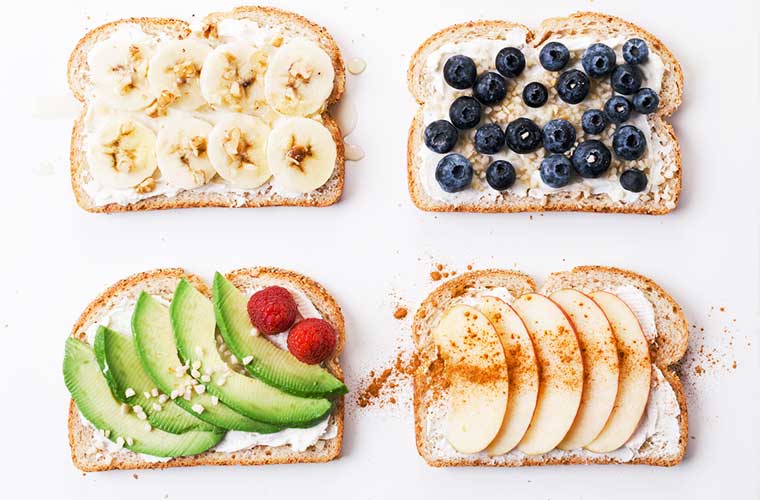4 Things This MD Wishes Everyone Knew About Eating Sugar
Have you ever wondered why, once you start eating sugar, it can be seriously hard to stop? It's not a matter of willpower, says Robin Berzin, MD—it's biology. Here, the functional medicine doctor and Well+Good Council member has some brilliant doctor's orders for keeping your blood sugar on the level.
Biologically speaking, your ancient ancestors (AKA the prototypes for the Paleo diet) lived off high-fat and protein consumption from animals (think: bison, fish, rabbits, seals, and even wooly mammoths early on) and high-fiber foods—nuts, seeds, grasses and berries—when they could find things to eat at all. It was a lucky day, for instance, when a pre-agricultural human came upon an apple tree—so when they did, they'd eat as many as possible, in order to store calories for the long haul.
Because of this, your body's adapted to seek out sugar and gorge on it when you find it. The problem? In a modern world where sweetened, processed foods are readily available 24/7, your consumption way outpaces that of your predecessors. Each of us, on average, consumes 66 pounds of added sugar per year. When you compare that to the amount of, say, avocados you're eating in that same time frame, it might not seem like so much. But unlike the natural sweet stuff you absorb from foods such as fruits and vegetables (approximately 84 pounds annually), the refined version is really not doing your body any good.
An intestinal microflora fed mainly on refined sugar has been linked to inflammatory diseases, altered stress responses, and mood disorders.
For starters, when sugar is high in the blood, the hormone insulin instantly tells your system to store it in fat cells called adipocytes, which is why eating added sugar and refined foods (just another source of sugar) causes us to gain weight. (It's also no coincidence that as added sugar intake increases, so does the likelihood of diabetes—put graphs of each side by side, and they nearly look alike.) Plus, it triggers the release of chemicals called cytokines, which, in turn, lead to inflammation—part of the mechanism responsible for depression.

{{post.sponsorText}}
Too much of the sweet stuff also changes your microbiome—the bacteria that live in your digestive tract and on your skin. These good bugs regulate both your immune system—70 percent of which is in your gut—and neurotransmitters, the chemicals that are active in your brain. An intestinal microflora fed mainly on refined sugar has been linked to inflammatory diseases, such as Crohn’s disease and irritable bowel syndrome, as well as altered stress responses and mood disorders.
But there are a few things you can do to maintain a healthy balance while still enjoying the sweet life.
Here are 4 rules I recommend my patients follow when eating sugar.

1. Create a sugar cap
Research from University of California, San Francisco's sugar science recommends a total of 25 grams of sugar daily, maximum—or less than 10 percent of your total calories. This includes both natural and added sugars in juices, fruit, and sweeteners. Keep in mind that many options from popular cold-pressed drink brands contain more than a day's worth of sugar per bottle—and healthy bars have 20–25 grams on average, FYI.
2. Chew it—don't drink it
The truth is natural sugars in whole, organic fruits that you bite and chew are best. All forms of refined or concentrated sugar—agave, simple syrup, maple syrup, honey, and white and brown sugars—as well as simple carbs like breads, pastas, crackers, and other flour-based products, are inflammatory. High-fructose corn syrup, and fructose in general, is more inflammatory than non-fructose-based sugars. If you're going to add sugar to something, I recommend using raw organic honey (which includes natural enzymes and immune-boosting nutrients like propolis), maple syrup, or brown, unbleached, organic sugar cane.
3. Find your sweet spot, timing-wise
At Parsley Health, I recommend noon to 6 p.m. as your sugar window, and ideally post-exercise if you're craving sugar after workout, as your body will store some of that sugar in muscles and the liver for later. Why? In the morning, your cortisol is naturally higher. When cortisol is high, insulin is higher, and sugar is stored more readily as fat. In the evenings, sugar is a stimulant that can interrupt sleep and natural circadian rhythms. And even though cortisol is lower in the evening, your metabolism’s natural daily rhythm is set to wane at this time, so your body is less tolerant of a sugar influx.
4. Slow your sugar roll
Sugar is best consumed in the presence of fat, protein, and fiber, which slow down the insulin response and trigger leptin, the hormone that tells your brain you are full, so that you don’t gorge. Healthy fats and fiber will keep you full, feed a healthy microbiome, and balance your insulin response.

Robin Berzin, MD, is the founder and CEO of Parsley Health, an innovative primary care practice with offices in New York, Los Angeles, and San Francisco. Dr. Berzin attended medical school at Columbia University. She is a certified yoga instructor and a meditation teacher.
What should Robin write about next? Send your questions and suggestions to experts@www.wellandgood.com.
Food + Nutrition week is brought to you by siggi's
Loading More Posts...